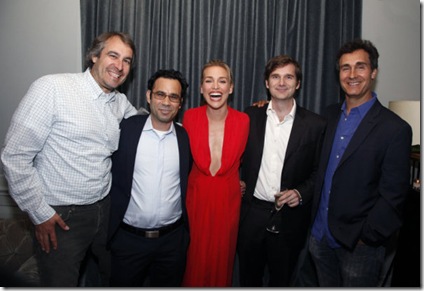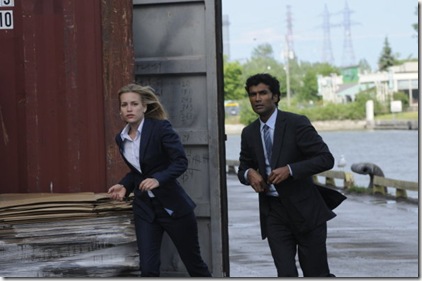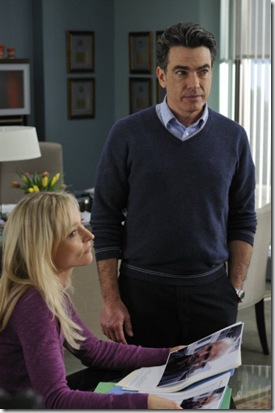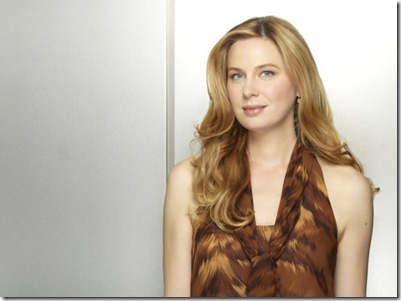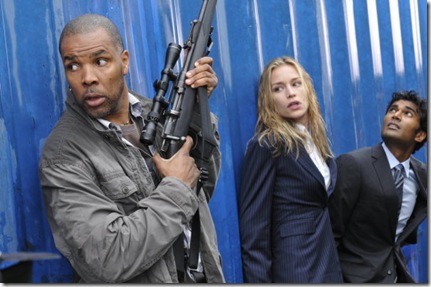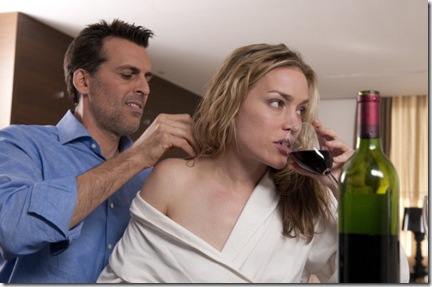Covert Affairs [Tuesdays, 10/9C] is the latest series to produce solid ratings for the ISA Network. The breezy-with-a-dark-undercurrent series was created by executive producers Chris Ord and Matt Corman [pictured above with series star Piper Perabo and executive producers Doug Liman, Dave Bartis] – who took time from their duties as overseers [executive producers] of the show to speak with a select group of bloggers/journalists, including yours truly.
Can you tell us how you came up with the idea of the show and how is it going to be different from other shows of this kind because I know of people are comparing it to Alias and stuff.
Chris Ord: When we came up with the show, we originally conceived it as more of a workplace show. That was our way into it. We really wanted to examine the CIA as a workplace and all the politics that go along with that and just what it’s like to actually work in such an odd institution. When you really look at the CIA, you realize that if you work there, A, you don’t get a lot of credit for the work you do because you can’t tell anyone about it. B, you don’t make very much money. And so it’s a very interesting person who chooses do this because the upside is just about self satisfaction and knowing you’re helping your country and doing what you can to help your country.
So we really wanted to examine the type of people that work there and the type of people who choose to do a job like this. That was the first seed of the idea and then as we started crafting it, the characters started to come to us and then the action and spy intrigue came after that. We started with the characters and worked our way backwards
Now, Piper Perabo said in an interview that her sister, Danielle, that obviously her life is going to get more complicated. Can you tell us, give us a hint of what’s coming ahead for her and for their dynamic?
Matt Corman: For us, one of the most interesting aspects about being in the CIA is the confluence of your work life, which is potentially dangerous, has a lot of intrigue and secrets, and a normal home life. Everyone in the CIA is somebody’s son or daughter. Often cases, they’re married. They have a boyfriend or girlfriend. And there’s complex emotional negotiations as to whether or not you tell the people around you what you do or how much you tell them.
At the outset of our series, of course, Danielle is completely in the dark and Annie is protecting her from this information. As the series progresses, that dynamic will be tested and it’s very difficult for Annie because the person who she’s closest to in her life is her sister. She tells her sister everything – except there’s this one blind spot where she’s lying about exactly who it is that she is. So we’ll progress that, but it will take time.
Ord: It’s not as simple as just reading her in. I think what everyone at the CIA recognizes is that if you tell somebody you’re in the CIA, which there are times you can do that, you are putting their lives at risk now by doing so. It’s not a decision to taken lightly and we want to explore that as the series goes on.
Going on what you just said, I know that you’ve talked to a lot of people at the CIA. I know obviously you can’t tell us a lot of certain things. But can you quickly talk about what the experience was going there and seeing that?
Corman: It was very important for us to go because we recognized entering into this process that our entire conception of what the CIA is was based on other television shows and movies. And as writers we always try and do as much research as possible and throw ourselves into the world that we’re creating. So it was absolutely vital for us to get there.
It wasn’t that easy to gain access because they’re not really an outward facing agency. They’re very internal. They don’t do a lot of interfacing with the public. So we had to send a lot of emails and place a lot of phone calls. But finally we were able to get in and it was transformative, as far as this process because a lot of the details that you saw on pilot and you’ll see on the show going forward were borne out of our experiences. For example, there is a food court with a Starbucks. There are a lot of young people that work there. You are not allowed to bring cells phones into the building. Just some of the little details just came from walking around and talking to people.
I’ve been talking to people since the premiere and seeing what they feel. The reaction has been really positive. So has the reaction been like for you guys?
Ord: We’ve been feeling very positive reactions, which we’re thrilled about. We were very proud of the pilot and we were happy with the way it all came out. We do make these shows for people to watch and enjoy. And that was really important to us. It seems from the reports we’re getting that people really enjoyed it and are looking forward to more episodes.
Moving forward in the series, there’s a character coming up that we really haven’t seen or really anything of yet and that’s a Sendhil’s [Ramamurthy] character. So can you speak a little bit about him?
Corman: Sendhil is going to be playing a really interesting character named Jai Wilcox who’s a second generation CIA man. First of all, Sendhil is a magnificent actor and we’re really lucky to have him and he’s a good guy to boot. But the character is very complex because he’s caught between two father figures. He’s working for Arthur Campbell, who’s played by Peter Gallagher and then his father was legend at the CIA. So he’s in a very complicated situation and he’s someone who is going to be getting close to Piper’s character for various reasons. And we don’t want to tip our hand too much, but their relationship is going to be very juicy and it’s going to have a lot of layers to it.
And speaking of relationships, one final thing is how would you guys pinpoint the relationship between Annie and Auggie right now and where do you see that going?
Ord: I think what we love about the relationship right now, and it’s both on screen and off screen, is that Piper and Chris just became fast friends immediately both as Auggie and Annie, but also off screen. And they get along really well and you feel that when you see them interact on screen. So we really see the relationship right now as friendship and it’s great for Annie to have such a cool mentor in the agency. But over time and over the series, I think if we have the fortune of having a number of seasons, we would definitely explore romantic possibilities between the two, but that would be way down the road.
Suddenly out of nowhere – not counting Burn Notice, which is burned spy – there are two spy series coming up. Essentially there’s Covert Affairs, which is just getting started and NBC has J.J. Abrams Undercovers. So I’m wondering, why a spy series, why now?
Corman: It’s funny. Things tend to cycle through. As you see with this Russian spy ring, it’s definitely in the zeitgeist. I think people are interested in the role of the CIA right now, which is changing. Technically and traditionally the purview of the CIA has been spying on foreign countries in other countries. But increasingly, it’s becoming a more tactical agency and also having somewhat of a role domestically. So as Americans and America tries to figure out what they want their CIA to be, it becomes good fodder for television.
So I think it’s just in the public’s mind right now and there are other shows. I think we’re confident that when people tune into our show, they’ll see that it has its own voice, its own tone and its own vibe and is very specific.
Ord: I think that’s a question for the networks in a sense. We started creating this show almost three years ago when we first thought of it. We didn’t know that all these other shows were on the horizon. But I think as Matt said, there is a collective zeitgeist that just feels that the time is right to launch these shows. We were fortunate enough that USA picked us up and we were on air.
One of the more interesting relationships on the show is between Joan and Arthur. At the very least we can describe their relationship as unusual. On top of the friction in their personal lives, she works for him. What can we expect to develop there?
Corman: You’re quite right. It’s always complicated to work with someone you’re married to. This is an added specificity of complication in that, as you said, she does work under him. But both of them I think it’s important to note are committed to trying to make their marriage work, so that’s what we can see, them trying to work through it on an emotional level and trying to cohabitate as coworkers as well. So we thing both actors, Peter Gallagher and Kari Matchett, are totally gifted and we really love that dynamic, so you can expect to see more of that.
Lastly, when we talked to Tim Matheson yesterday, he was asked what role he’d like to play as a guest on Covert Affairs and he replied he’d like to be a double agent. What do you think?
Corman: Hey, man, we think that that would actually be great. He’s a tremendous actor and I know he did a great job with the pilot. So I think we’ll have to take that note and see if it fits in anywhere down the line.
My question for you is as you’ve even talked about before, the show has been compared to Alias. But in a lot of ways, it seems more like true life than Alias ever did. Do you think based on your experiences at Langley that that’s actually true?
Ord: Yes, definitely. I think we’ve always intended this to be first off, a more grounded CIA. Obviously, it’s a TV show, but we wanted to start with a foot in reality and create stories from there. Also, I think there’s a big difference in the two lead characters of our show and that show, which is Annie is pulled out of training a month ahead. She is not a superhero by any means. She’s not as skilled in fighting or lock picking, things like that. It’s because of that that we feel, it’s that an experience that makes our show unique in the sense every action set piece we craft, we’re always thinking what would it be like to be Annie in this situation.
As you see in the pilot, she’s fighting a world renowned assassin on the subway at the end. And what she does have is a tenacity and a will and a perseverance to never give up fighting. But as you see, she jumps on his back, she’s doing anything she can to get a hand on this guy. It’s that disparity that we really feel shows her character and is the foundation of our show.
When you were doing the research talking to the people and going to Langley and such, what did you learn that surprised you the most about the whole CIA lifestyle?
Corman: Surprised us the most about the lifestyle, one thing, and you might presume this, but it was interesting to hear it is that when officers are in the field, they’re given an enormous amount of latitude. They may not communicate with Langley for days or weeks at a time. That to them is one of the most exciting parts about the job.
It’s on one level, this immense bureaucracy that has all the safeguards and bureaucratic nonsense that any big company would have. But when you ascend to the role of operative in the field, which in general takes about seven years, all of a sudden you are almost like James Bond. You’re given such free autonomy to do your job that it’s kind of breathtaking even to them. So to us just to really hear how much without a net they’re able to operate out in the field was interesting.
What’s the biggest challenge in writing for this show?
Ord: I think we’re just constantly struggling to fulfill the parameters that we’ve set for ourselves, which is if you take a normal, ordinary person and put them into these situations, how do they navigate them. How does someone who doesn’t necessarily have the training or the skill get out of these pickles in a way that’s credible?
When designing the series, you designed season arcs and series mythology and you plot it out and then go back … the episodes with details to execute your vision.
Corman: Yes is the short answer. But we did think about the season and what we wanted to do with that and as we were crafting the all 11 episodes that will follow the pilot. And then there … little, I think, cues here and there that hopefully the audiences will pick up on in terms of playing that mythology out. But it was certainly in our minds as we crafted the season, and then within that, we wanted to write individual episodes that could stand on their own, so that there’d be a case or something or mission that Annie has to complete by the end of the episode. So we’re cognizant of doing both.
What were some of the other inspirations, be it books, movies, other TV shows once you figured out that there’s more, much more of a workplace show and more of a spy show, what were you looking at?
Ord: In terms of where we’re finding our stories and things?
No, in terms of other things you’ve looked at, just in terms of what has influenced you in crafting this.
Ord: I think, actually, we did a lot research beyond just visiting the CIA, trying to do as much combing through new articles as possible, finding real stories that we could use as a jumping off place. I think that was helpful to us to recognize what was out there, what would be interesting that could make the seed of a good story and go from there. We really tried to do that and have everything from Annie and what it would be like to be in her situation doing these missions.
I was wondering about the decision to make Chris Gorham’s character blind and could you talk about that and what you see is that in maybe being a positive as far as story and that sort of thing.
Corman: Chris Gorman is a really gifted actor, first of all, and he’s doing a tremendous job with it. We’re so appreciative of his efforts because it’s not an easy thing to pull off. The idea to do this character was based, actually, on a friend of ours who was an accident. In his case, he was paralyzed. He was not blinded. But the accident was transformative for him in many ways terrible, but in some ways good. His character changed to a certain extent. He became more inquisitive, more open, in some ways more emotional, so that was the starting off place.
We wanted to look at a character who in Auggie’s instance was in the military and was probably a very straight forward person before his accident. But afterwards, it has opened him up to the world, made him a little bit more vulnerable, perhaps given him a sense of humor that he didn’t have before. That was sort of our way into it.
Ord: And going from there with Chris Gorman, it was important to us as we cast the role to have an actor who could do it without sunglasses on. I think that when you put those sunglasses on, it really puts a barrier between the character and audience. It was important to us that this character could connect with both Annie and our audience.
Corman: Chris has done an amazing job of really throwing himself into trying to understand what it means to live as a blind person. He’s constantly meeting the Canadian Institute for the Blind. We shoot the show in Toronto, Canada. He’s talked to a lot of blind people. He himself is involved in crafting the space in which he works and in which he lives. He’s consulting our set designers as to how a blind person would actually have … a room and what they need to function properly. So in many ways, he himself has become an in-house expert.
Ord: And every scene gets blocked that involves Auggie. It’s all determined on what he could do or not do in that situation. So if he doesn’t know that someone has left the room, well, he’ll play that. He’s a really gifted actor and he always has that in his mind and it’s been a great help to the show.
Also talk about launching the show in this world of social media where Twitter is such a big deal and Facebook. I know USA does a lot with both. Have you guys had a hand in that? Are you guys Tweeting? What’s the impact?
Ord: We’re both semi-… I think. I think we have not been Tweeting. We’re both on Facebook, which is a pretty impressive if you knew us.
Corman: I think it’s great. What we do appreciate is that it’s actually really helped launch the show and get the show to people in ways that you couldn’t do before, like this phone call and like the USA Network Web site, where you can see previews and things and interact with other fans of the show. We’re all for it. I think it’s really just helpful in terms of putting the show out there and having it actually interact with the world.
Ord: Chris Gorman is huge on Twitter.
Corman: So he’s all about it.
Ord: And Gallagher is on there, too, which ought to be interesting and Anne Dudek, too, so we feel the show is well represented on inter-webs.
We’re curious to hear more about your relationship as writing partners and how you started, how you met and how your past led you to where you are now.
Ord: Both Matt and I met in college. We went to Brown together. We started writing over a decade ago together. We were friends first and not all friends make great writing partners, but we really felt we clicked and had the same ethos and the same sensibility and it grew from there.
It’s been great. I think we recognized the value of writing as a team. We’ve actually taught seminars on collaboration and how to find value in it and it’s been great. I don’t know what else to add. I think it’s been very fruitful and productive for us and we’re really appreciative of it.
Can you talk a little bit about the casting process on the show?
Corman: We started first and foremost with Annie. It was critical that we get an amazing Annie. When Piper came in, we immediately knew she was the person. It was like a light bulb went off and then we couldn’t think about the character in any other way. She just inhabited it in such a natural way that it became self evident immediately that she had to be the person.
Ord: It was a challenging character to cast, too, in the sense she always wanted her to be beautiful and smart and athletic and charming and gifted and sweet. It was a big ask and when Piper came in, she answered all those questions and it was a … complete.
You mentioned where the idea of Auggie came from. I just wanted to know when you guys visited the CIA, did you … any agents like him? Or was there any agents that had disabilities?
Corman: That short answer is no. We didn’t see any blind people working there. There are certainly people with disabilities within the CIA, but we did not have the chance to interface with any of them in our visits. They’re intrigued by the character. They think it’s credible. Certainly a character like Auggie, there some limitations on what he can do, but we like to think that he’s always succeeding expectations and doing things differently than a sighted person might.
We actually have an episode coming up down the line without tipping our hand too much, where he’s going to get out into the field. And it was an exciting episode to write and I think the audience is really going to enjoy it.
Speaking of getting out into the field, is the show mostly going to be based with domestic issues, or will we see future episodes with North Korea or Iran or other countries?
Ord: Well, we haven’t hit the axis of evil yet, but we’re definitely getting out internationally. I think it’s going to be about 50/50 in terms of whether we’re DC based or out into the greater international world. We have episodes set in Zurich. We have episodes set in Venezuela so far, London, and then we also have ones that are more domestic related. So we wanted that mix and we wanted the ability to do that mix. We think we found it with this show.
Can you talk about what guest stars we’ll see this season?
Ord: Sure, we have some great stars. This coming Tuesday, you’ll see Steven Brand and Rya Kihlstedt who are fantastic actors. We have Oded Fehr coming up in a few weeks, who is great and really a pleasure to work with.
Corman: He plays a Mossad agent.
Ord: D.W. Moffat is coming up in a few weeks after that.
Corman: Lauren Holly.
Ord: Lauren Holly… I’m trying to think of who else… a very young gifted beautiful actress named Liane Balaban is coming up.
Corman: Eriq La Salle.
Ord: Eriq La Salle, we have some goodies.
You just talked about guest stars. Is there any kind of dream people that you’d like to work with on the show, if you could pick anyone?
Ord: I don’t think we’ve been so audacious as to dream too big. I think we have a great casting director with Susie Ferris, who cast the pilot and now she’s casting the series. She just has the ability to find very talented actors and bring them in front of us. So we trust her judgment and so far we have had just a phenomenal string of guest stars who can all not only act, but they’re great people and they brought a lot to the series. So we’ve been very blessed with Suzie.
M. Corman: And I would say for our main characters, we are working with our dream cast. Everybody that we got as a main or recurring character is sort of our first choice. And many of these people have or could carry their own show before. Chris Gorman had his own show. Peter Gallagher could absolutely have his own show if we wanted to.
Ord: Kari had her own show with Invasion.
Corman: Yes, and … is amazingly skilled and we’re lucky to have her. So we sort of feel like we have this murder’s row of people on our show that any one of which could carry their own television program.
What’s been your favorite moment so far, either during filming or just in general with working with the show?
Ord: It’s all been a really fantastic experience, so to pick out one moment, I would need a moment to think about that. So you have one?
Corman: Yes, I think it’s all been in aggregate a lot of fun. I think week in and week out, this is a bit of a general thing, but we’re doing some really amazing big action set pieces. So when we t-bone a car, that’s exciting. When we’re doing a big gag in an elevator shaft, that’s amazing. When we’re doing stuff on open water or big shoot-outs involving multiple people and the fact that we’re able to pull this off on eight day schedules on a TV budget and have it look authentic is exciting to me whenever we do it.
I’ve been really pleased thus far with the action we’ve been doing. The credit to that goes to our episodic directors, but also to our executive producer, Doug Liman, who’s been really involved in working with the directors week in and week out and prepping them on the action sequences and the template that we have for action on this show. He’s flown in several times to work with the directors and it’s made a huge difference.
Is there anything you’ve wanted to do, though, but you couldn’t? It seems like obviously you’ve done a lot of actions to scenes, but maybe because of budget, but maybe even just … they say you can’t do that. Is there anything like that?
Corman: I have to say we’ve been able to do everything that we’ve wanted to do. It’s been remarkable string of episodes. They’ve all been very ambitious from a production standpoint. We have a great crew and team up in Toronto who just find ways to get it done. It’s really satisfying to be ambitious and then pull it off. I think we couldn’t do that without our crew up in Toronto, but so far we’ve never had to compromise.
Like other USA shows, I’m thinking Burn Notice in particular, you have a series of episodic adventures, but there’s this ongoing arc revolving around Annie’s mysterious ex-lover. I’m just wondering is that going to be a full season arc or will it be more or less, and what happens with her once that ends since that’s really what got her into the Langley?
Ord: We don’t want to tip our hands too much, but it’s obviously a big part of her past. It will continue to play out for some time. When you say what happens when it ends, you presuming that it does end. So we want to leave that very open ended and we want to have the mystery that we established in the pilot continue on going forward. So I know that’s not the most specific answer in the world, but that is intentional.
I’m also wondering since Annie has this great rapport with Auggie, he’s kind of in way mentoring her because she’s not even completely trained. Will there be any other relationship like that within the office? I’m thinking will Joan mentor her as well? There seems like there could be something there – of a little more fractious nature maybe, but—
Ord: What we love with the dynamic with Joan and Annie and both Kari and Piper play it beautifully, is that they both see themselves in the other. So Joan is looking at Annie and saying that reminds me of me when I first entered the agency. And Annie is looking at Joan saying, wow, this is a strong, smart, powerful woman, but she’s pretty intense and is that going to be me in ten years. And so it’s that relationship and that dynamic that we really feel offers a lot of opportunities for great scenes between them and that will be ongoing throughout the series.
Also, I was wondering Arthur and Joan. Besides the stuff we talked about already, they kind of seem like they could be Mr. and Mrs. Smith 15 years down the line. Are we going to get a look at how they rose to the positions that they’re in?
Ord: Potentially, yes, maybe we’re definitely going to get into their back story more. I think it’s really interesting to see people that are both powerful, both within the same industry, try to navigate that. So absolutely, we’re going to get into their backstory a bit more.
Corman: And in our research, one thing that really came out of the CIA in terms of relationships is that working at the agency is very hard on relationships. I think when we asked everybody there that question to a T, they said no doubt, it’s very hard on relationships. We’ll watch Joan and Arthur go through those ups and downs and we think that’s really in those sort of character relationship moments is where the heart of the show really lies.
Speaking of relationships and the CIA, I thought Eric and Piper would make a good looking couple. Is there any chance that Conrad and Annie would get together?
Ord: That would be much further down the road.
But it’s a possibility.
Corman: When we brought in Sendhil, I think we had to… Eric Lively did not stay on the show and so it would have to be way down the road for them to come back together.
Again, talk about relationships, I don’t remember who it was, but I think somebody last night mentioned something about they prefer the relationships to be within the CIA as opposed to people that they don’t know about. Is that true or is that just something that you put in for creative license?
Ord: No, that is true. They actually encourage dating and relationships within the agency. The reason is from a national security, it’s a national security reason, which is when you have two people who are together in the agency, A, those are two loose ends that can be tied up. And then, B, it’s easier for those people to empathize with one another. They can recognize the challenges of working in this job, even if they can’t exactly talk about classified information with each other. At least they can recognize what the other might be going through. Does that make sense?
So, you both write and produce. Have you ever been interested in acting or directing maybe later down the road?
Ord: No.
Corman: No, we have enough on our plates.
Now, when you created these characters, is there anything that you took from your own life that you infused the show with? Obviously, you’re not CIA agents, at least I think not.
Ord: Not that you know of. Yes, I think whenever you write characters, you pull little bits from one’s own life. All these characters have little pieces of us in them. To be really specific about it would be hard, but everything we do informed by our own experiences. I think that’s what all good writing is. You’ll pulling from the full pantheon of your human experience and using things as you see fit. But none of the characters are like specifically based on us.
Corman: No, no, the closest we go is the inspiration for Auggie with a mutual friend, but that’s as far as we really base anything on life.
Do you have any advice if people wanting to get into the kind of jobs you have?
Ord: I think the key is always reading, always be writing. I think the more original you could be in your writing, the better off you’ll be. Oftentimes people try to write things with an eye towards the marketplace and that’s very difficult. It’s better to just write from your heart and the marketplace will find you if things are really specific and really interesting.
